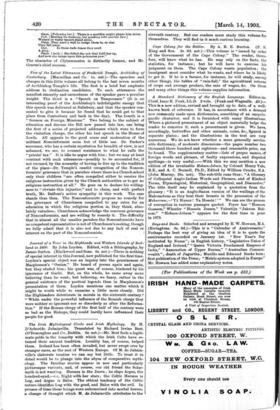Five of the Latest Utterances of Frederick Temple, Archbishop of
Canterbury. (Macmillan and Co. is. net.)—The speeches and charges in this little volume all belong to the last seven months of Archbishop Temple's life. The first is a brief but emphatic address to Ordination candidates. To such utterances the manifest sincerity and earnestness of the speaker gave a peculiar weight. The third is a "Speech on Temperance" (it is an interesting proof of the Archbishop's indefatigable energy that this speech was delivered at Salisbury, and that the speaker con- sented to give it because he found that he could get to that place from Canterbury and back in the day). The fourth is a "Sermon on Foreign Missions." Two belong to the subject of education and discuss the Bill now passed into law, one being the first of a series of projected addresses which were to form the visitation charge, the other his last speech in the House of Lords. All appeals to the good sense and moderation of the militant Nonconformist seem but of little use. Dr. Parker's successor, who has a certain reputation for breadth of view, is not ashamed, we see, to counsel resistance to what he calls the "priests' tax." It is idle to argue with him ; but we may at least contrast with such utterances—possibly to be accounted for, if not excused, by the necessity of having to live up to the tradition of the place—Dr. Temple's candid recognition of the Noncon- formists' grievance that in parishes where there is a Church school only their children "are often compelled either to receive the religious instruction given by the Church authorities or to get no religious instruction at all." He goes on to declare his willing- ness to " obviate this injustice," and to claim, and with perfect truth, Mr. Balfour's active sympathy in this work. The ease stands thus then. The Nonconformists propose no remedy for the grievance of Churchmen compelled to pay rates for an education in which the religious portion is, they think, abso- lutely valueless ; Churchmen acknowledge the converse grievance of Nonconformists, and are willing to remedy it. The difficulty thatin almost all the smaller parishes the Nonconformists have no competent representative is not of Churchmen's making, though we fully admit that it is also not due to any lack of zeal or interest on the part of the Nonconformists.










































 Previous page
Previous page